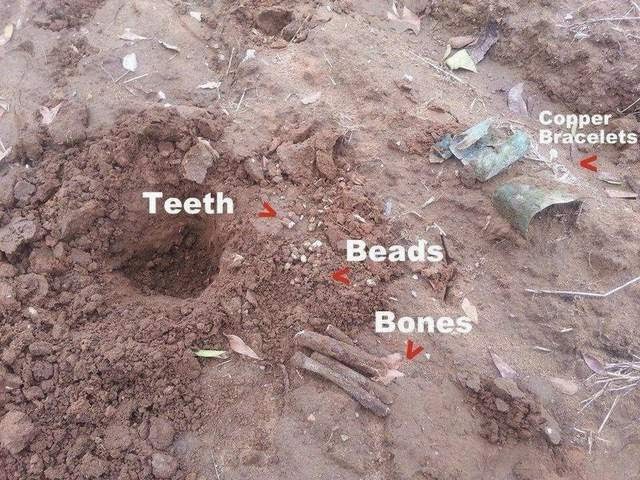
Ray Camp was on private property not far from Wind Creek Wetumpka Casino trying out his new XP Deus metal detector when he made the discovery. The metal detector helped him locate a copper bracelet about four or five inches below the surface.
Then Camp realized there was bone attached to the bracelet. He also found teeth, beads and other bones in the same location.
He contacted Heath Jones, founder of the Alabama Archeometalology Historical Society, a group of archaeological and metal detection hobbyists that Camp is a member of.
Jones said he advised Camp to contact Wetumpka police to ensure that it was not a crime scene, and state archaeologists also were contacted.
Wetumpka police officers responded and secured the site, and archaeologists planned to visit the site Monday afternoon.
Jones said his group, which consists of eight to 10 members from various parts of the state, prides itself on being respectful and following the correct procedures.
“It is an important part of who we are and how we go about these things,” Jones said.
Stacye Hathorn, state archaeologist with the Alabama Historical Commission, said she would be inspecting the site in an effort to determine whether the remains are from a Native American burial.
Hathorn said discoveries of Native American burials are not common in Alabama but that they are not unheard of.

She said that once the remains are inspected and the historical significance is determined, the remains will be placed back into the ground in accordance with state law.
Hathorn said more would be known about the remains by this morning.
Jones called the discovery “the find of a lifetime.”
He said the copper bracelets, beads and proximity to the casino, where other remains have been located, all lead him to believe that Camp’s discovery is of a Native American burial site.
Jones said it was the first time someone in the group had discovered human remains with a metal detector and the first time he has heard of that happening in the state.
Most of the group’s historical discoveries involve items such as musket balls and other artillery from the Civil War along with items such as old coins, Jones said.
The group is mostly made up of former police officers and military members, Jones said, adding that he spent 16 years as a police officer in Heflin and as an undercover officer with the Alabama Alcoholic Beverage Control Board.
Jones said he and the group want to keep the exact location of Camp’s discovery under wraps right now to keep away anyone with less than honorable intentions.
“We are not treasure hunters, and we want to prevent that type thing from happening,” he said.
Source: The Tennessean [December 16, 2013]